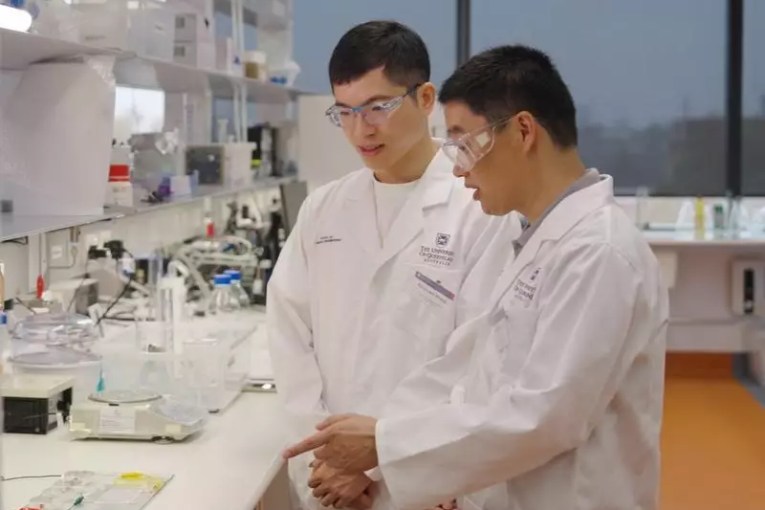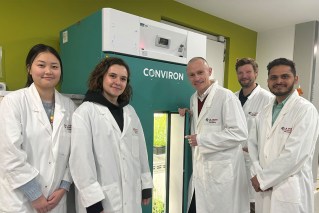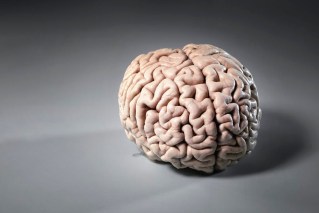As vaccines loom, here are five big questions we need to answer
The news of multiple experimental COVID-19 vaccines showing early signs of promise has triggered a wave of optimism in recent weeks — and a lot of questions.

All of what's known about the two leading coronavirus vaccines is based only on statements from drug companies, not published scientific studies. (Photo: Getty Images: Yulia Reznikov)
Late yesterday, Oxford University and AstraZeneca announced their coronavirus vaccine is 70 per cent effective at stopping people getting sick, and 90 per cent effective under one dosing regimen.
This news follows similarly positive developments from Pfizer, which became the frontrunner in the global vaccine race when it released preliminary data showing its vaccine contender is 90 per cent effective. The pharmaceutical giant later reported complete results that indicate the shots are in fact 95 per cent effective.
Earlier this month, US drug manufacturer Moderna released interim trial data indicating its vaccine appears to be 94.5 per cent effective.
Most experts agree the results look promising. But the data are yet to be published in peer-reviewed scientific journals and there’s still a lot we don’t know about how well these vaccines work.
We asked immunologist Dr Larisa Labzin and vaccine expert Dr Kylie Quinn to help answer some of your most common coronavirus vaccine questions.
How effective are coronavirus vaccines?
There are currently 12 COVID-19 vaccine candidates in phase-3 clinical trials, with Pfizer, Moderna and now AstraZeneca and Oxford the first to release interim data.
Pfizer — in collaboration with German drug-maker BioNTech — launched a large phase-3 study involving over 43,000 people. Half the trial participants received the vaccine, while the other half got a placebo of salt water.
Over the course of several months, 170 volunteers in the trial contracted COVID-19. Of them, 162 had been given the placebo, while eight were in the vaccine group.
Based on that data, Pfizer estimates the vaccine is 95 per cent effective at stopping people getting sick.
“Vaccine efficacy is a measure of how well a vaccine works in terms of its ability to reduce infection or disease,” Dr Quinn said.
“It’s the per cent reduction in disease that you would expect from an unvaccinated population to a vaccinated population.”
In Moderna’s phase-3 clinical trial, which involved 30,000 people (who either got a vaccine or a placebo), 95 trial participants contracted COVID-19. Of the people who got sick, 90 had received the placebo, while just five had been vaccinated.
Based on that data, Moderna estimates its vaccine is 94.5 per cent effective.

So far, no major safety concerns have been reported in either Pfizer or Moderna’s COVID-19 vaccine trials. (Photo: Pexels)
Yesterday, AstraZeneca said late-stage trials of its COVID-19 vaccine had been “highly effective” in preventing disease.
More than 20,000 people are involved in its study, and the interim findings are based on 131 cases of COVID-19. According to the BBC, there were 30 cases of COVID-19 in people who had the vaccine, and 101 cases in people who received a placebo.
Researchers found that if people were given a half dose followed by a full dose of the vaccine, rather than two full doses, about 90 per cent of them were protected. Where two full doses were given at least one month apart, it showed 62 per cent efficacy.
The combined average across different dosing regimes, which had a total of 11,636 trial participants, was 70 per cent effective.
It’s important to note we’re actually talking about vaccine “efficacy” — a measure of how well a vaccine works in controlled clinical trials.
Vaccine effectiveness, on the other hand, is measured in the real world — once a vaccine has been approved for use in the general population.
Quinn said a vaccine’s effectiveness can be lower than its efficacy, because of the obstacles that come with delivering a vaccine outside a “really idealised setting” like a trial.
Unlike Pfizer and Moderna, the AstraZeneca-Oxford vaccine does not have to be stored at ultra-cold temperatures, making it far easier to distribute in developing countries.
“Maybe a vaccine gets to a doctor’s office and the refrigeration isn’t ideal, the person giving it isn’t well trained in that particular vaccine …. or the timing of the vaccine booster isn’t exactly right,” she said.
“All those sorts of things can change how protective a vaccine might be in certain scenarios.”
Still, the efficacy figures reported, particularly by Pfizer and Moderna, are up there with some of the best vaccines we have, and far exceed the US Food and Drug Administration’s requirement that coronavirus vaccines be at least 50 per cent effective to be approved.
“If you’re a vaccine researcher, getting a vaccine over 90 per cent is a gold star — that’s your dream,” Dr Quinn said.
Do vaccines prevent disease or infection?
The type of efficacy that’s been reported for these trials is protective efficacy against disease — in other words, how well the vaccine protects people from getting sick.
Whether or not these vaccines prevent people from getting infected in the first place is a separate question, and not one researchers can answer just yet.
Labzin said it’s possible there were people in the trials who received the vaccine, got infected with COVID-19, but didn’t develop any symptoms.
They wouldn’t have been identified, nor included in interim analyses, because researchers were specifically looking at whether the vaccine stopped or reduced the severity of COVID-19 symptoms — not whether the vaccine prevented the virus from entering a person’s body.
“That’s going to take a lot more analysis of the data and a lot more time,” Labzin said.
Both Pfizer and Moderna have indicated that their vaccines appear to prevent both mild and severe forms of COVID-19.
Of the 10 cases of severe COVID-19 reported in Pfizer’s trial, only one person had received the vaccine. In Moderna’s study, 11 people were seriously ill, all of whom were in the placebo group.
It’s not yet clear from the AstraZeneca-Oxford trial how many people developed mild versus more severe forms of COVID-19.
Assessing whether a vaccine prevents infection (rather than the development of disease) is particularly challenging to study in humans, partly for ethical reasons.
In these trials, the drug companies waited for people to get sick to determine whether the vaccine offered any protection.
But to work out if the vaccine prevents infection, Labzin said researchers would ideally vaccinate people and then deliberately expose them to the virus — to see if they get infected, even if they don’t develop symptoms.
These trials, known as human challenge trials, are usually only performed when a specific treatment (for whatever disease you’re trying to prevent) is available, which we don’t yet have for COVID-19, Quinn said.
“That’s why in these first interim results we’re just talking about: do people get sick or not?” she said.
Can a vaccinated person still spread the virus?
One of the reasons it’s important to find out whether coronavirus vaccines prevent infection (and not just disease) is because it will help determine whether or not vaccinated people can still transmit the virus — even if they’re not sick.
“Ultimately, the best kind of vaccines are the ones that stop infection from being able to establish a foothold at all,” Labzin said, “so if we get exposed and we’re vaccinated, we’re not going to accidentally transmit that on to someone who’s not vaccinated.”
Quinn said the mechanism used in the experimental vaccines to prevent disease “should also hopefully be reducing viral load in people” and therefore reduce their likelihood of shedding the virus and infecting someone else.
“But it’s really hard to say at this point whether either of these vaccines are impacting infection rates … and how they’re impacting the likelihood of someone who is vaccinated [passing] the infection onto other people.”
That all depends on viral load and how much viral replication is happening, Quinn said.
‘They do have ways of looking at that, but that kind of information won’t come until later.”
Quinn said there are examples of other vaccines where people can be vaccinated, but still spread a disease to others.
“There is a concern, for example, with the whooping cough vaccine,” she said.
“A few years ago we changed to a new kind of vaccine … and we’re sort of seeing in our population small outbreaks of whooping cough, and so we’re trying to understand where that’s coming from.”
One possible explanation, she said, is that the new vaccine is effective at preventing disease, but that the bacteria that causes whooping cough may still be able to “live in our systems”.
“It’s unclear as to whether [the] vaccine actually prevents transmission or not, and it’s really hard to measure that. But it’s definitely a question in our minds.”
Do vaccines protect vulnerable people?
Another important question when it comes to assessing the effectiveness of a vaccine is how well it works in vulnerable populations, such as the elderly, who do not always respond strongly to vaccines.
“For both Moderna and Pfizer, they’ve been really active in trying to recruit older individuals and people with comorbidities … to make sure the vaccine is hopefully going to protect groups that are most at risk for severe disease, which is a real challenge for COVID-19,” Quinn said.
In Pfizer’s trial, a little over 40 per cent of participants were aged 56 and above, and 42 per cent were from racially and ethnically diverse backgrounds.
Research has suggested that black and minority ethnic COVID-19 patients are at a higher risk of death.
According to Pfizer, the efficacy of its vaccine was consistent “across age, gender, race and ethnicity”.
The company reported the vaccine was 94 per cent effective in adults over 65, though it’s not clear how they determined effectiveness in older adults, with only eight infections in the vaccinated group to analyse and no breakdown provided of those people’s ages.
Moderna’s trial also included a significant proportion of people over the age of 65, people with chronic diseases that put them at increased risk of COVID-19, and communities that have historically been under-represented in clinical research, including Hispanic, black and Asian Americans.
The company also reported its vaccine appeared effective in all subgroups, but in Moderna’s case, more research (a second and final interim analysis) is needed to confirm this finding.
Similarly, early data from phase 2 of AstraZeneca-Oxford trial has indicated the vaccine produces a strong immune response in older adults, but more phase 3 data is needed to confirm the results.
How long will the immunity last?
It will take months — if not years — to fully understand how long immunity generated by these vaccines lasts.
Both Pfizer and Moderna started their trials in late July, meaning they’ve only been able to follow their study participants for a few months, Labzin said.
“It’s pretty hard to know at this stage and it will be something we measure over ongoing observational studies — the phase 4 trials,” she said.
Scientists are still trying to understand what kind of immunity is generated from COVID-19, how long that immunity typically lasts, and how many (and what type of) antibodies are needed to mount an effective response.
At the moment, the best indicator of how long coronavirus vaccines might last is to look at the immunity generated by natural COVID-19 infection.
Reports on this have varied in recent months, with some research suggesting our immune response “potentially isn’t that long lasting”, Labzin said.
“But it might be that we get much better, long-lasting immune responses with the vaccine compared to natural infection.”
Just last week, preliminary data from one of the most comprehensive COVID-19 studies on immune memory was published, suggesting protection may last years, Quinn said.
“The antibodies in circulation drop off, but the cells that make them look like they’re sticking around,” she said.
“Their work is indicating that immunity is looking pretty good.”
Pfizer had applied to the FDA for emergency authorisation of its vaccine, and Moderna is expected to do so soon.
AstraZeneca has also begun the process of preparing its vaccine for regulatory approval.
– ABC / © 2020 Australian Broadcasting Corporation. All rights reserved.












